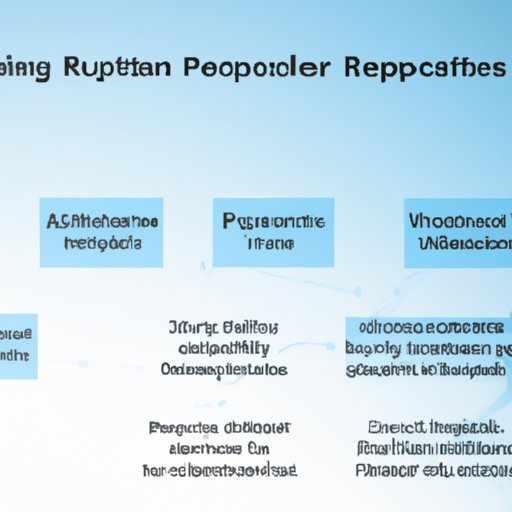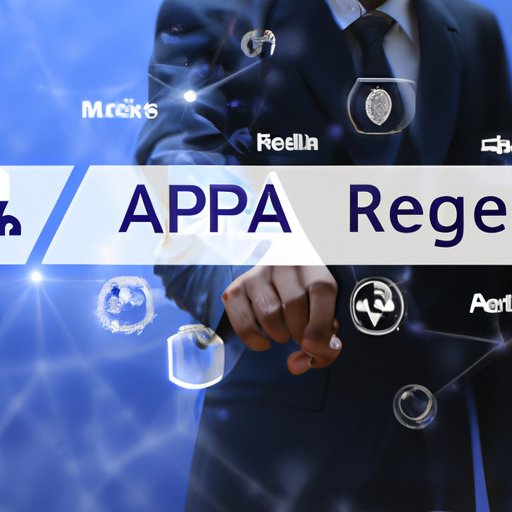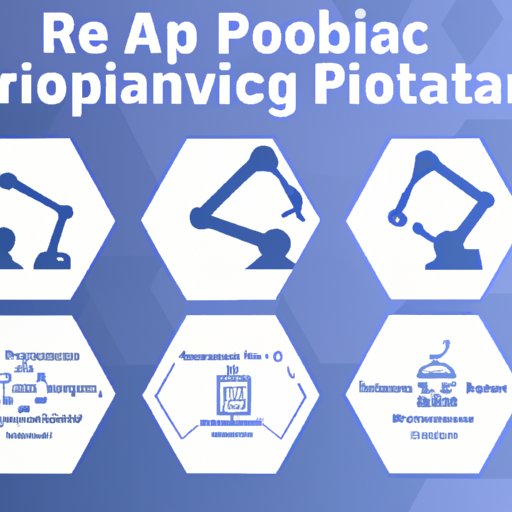Introduction
Robotic process automation (RPA) and artificial intelligence (AI) are two powerful technologies that have been revolutionizing the way businesses operate. RPA is a computer software technology that automates repetitive tasks, while AI is an umbrella term that encompasses various technologies, such as machine learning and natural language processing, which allow computers to mimic human intelligence.
These two technologies have become increasingly intertwined in recent years, leading to the question: Is RPA part of AI? This article will explore the relationship between RPA and AI, examining how they can be used together to automate business processes and what the future holds for this dynamic duo.
Examining the Relationship Between RPA and AI
The relationship between RPA and AI is complex, but the two technologies complement each other and can be used together to increase efficiency and reduce costs. According to a study by Deloitte, “RPA acts as a catalyst for AI-enabled automation solutions, as it provides the foundation for more advanced cognitive and AI capabilities.”
RPA can be used to automate mundane, repetitive tasks, freeing up employees to focus on more strategic initiatives. AI, on the other hand, has the ability to learn and adapt, making it ideal for more complex tasks. By combining these two technologies, businesses can achieve a higher level of efficiency and accuracy.

Benefits of Utilizing RPA and AI Together
When utilized together, RPA and AI can provide a number of benefits to businesses, including increased efficiency and cost savings. According to a study by PwC, “Organizations that use RPA and AI together report higher levels of productivity, improved customer experience, and greater cost savings than those that use either technology alone.”
By automating mundane tasks with RPA, businesses can free up their employees to focus on more meaningful work. AI can then be used to analyze data and uncover insights that can help businesses make better decisions. Combining RPA and AI also allows businesses to automate more complex processes, resulting in increased efficiency.

How RPA Enhances AI Capabilities
RPA can be used to enhance AI capabilities by providing the data needed to feed AI algorithms. According to a study by Gartner, “RPA is essential to the successful implementation of AI, as it can provide the data needed to train and improve AI algorithms.”
RPA can also be used to automate manual tasks that would otherwise need to be done by humans. This can result in increased accuracy and fewer errors. By automating these tasks, businesses can save time and money, and focus on more strategic initiatives.
How RPA and AI Can Automate Business Processes
RPA and AI can be used together to automate a wide range of business processes, from customer service to financial operations. For example, AI can be used to analyze customer data and identify patterns, while RPA can be used to automate customer service tasks, such as responding to customer inquiries or processing orders. This can result in faster response times and improved customer satisfaction.
RPA and AI can also be used to automate financial processes, such as invoice processing and fraud detection. AI can be used to analyze data and detect potential fraudulent activity, while RPA can be used to automate the tedious task of manually processing invoices. This can result in faster processing times and improved accuracy.

Exploring the Impact of Combining RPA and AI
The combination of RPA and AI can have a significant impact on businesses. According to a study by McKinsey, “Organizations that adopt both RPA and AI technologies can reduce costs by up to 40 percent and increase revenues by up to 25 percent.”
By automating mundane tasks with RPA and utilizing AI to uncover insights, businesses can achieve increased efficiency, improved customer satisfaction, and reduced costs. This can result in increased profitability and a competitive edge in the marketplace.
The Role of RPA in AI Development
RPA plays an important role in the development of AI. According to a study by Accenture, “RPA enables organizations to collect data at a much faster rate, which can be used to train AI algorithms and improve their accuracy.”
RPA can also be used to automate the data collection process, which can significantly reduce the time and resources needed to build an AI system. This can result in faster deployment times and lower costs, making it easier for businesses to implement AI.

The Future of AI with RPA Integration
As RPA and AI continue to evolve, the possibilities are endless. According to a study by Forrester Research, “The combination of RPA and AI will continue to revolutionize the way businesses operate, enabling them to automate more complex tasks and uncover valuable insights.”
The combination of RPA and AI can be used to automate a wide range of tasks, from customer service to financial operations. As these technologies continue to develop, businesses will be able to gain a competitive edge by leveraging the power of automation.
Conclusion
In conclusion, RPA and AI are two powerful technologies that are becoming increasingly intertwined. RPA can be used to automate mundane tasks, while AI can be used to analyze data and uncover insights. When utilized together, these technologies can provide a number of benefits to businesses, including increased efficiency, improved customer satisfaction, and reduced costs. The combination of RPA and AI will continue to revolutionize the way businesses operate, enabling them to automate more complex tasks and uncover valuable insights.
Summary of Key Points
This article explored the relationship between robotic process automation (RPA) and artificial intelligence (AI). It examined how RPA can enhance AI capabilities, how they can be used together to automate business processes, and what the future holds for this dynamic duo.
RPA and AI can provide a number of benefits to businesses, including increased efficiency and cost savings. These two technologies can be used together to automate a wide range of tasks, from customer service to financial operations. As these technologies continue to develop, businesses will be able to gain a competitive edge by leveraging the power of automation.
Final Thoughts
RPA and AI are two powerful technologies that are becoming increasingly intertwined. By combining these two technologies, businesses can achieve a higher level of efficiency and accuracy. As these technologies continue to develop, businesses will be able to leverage the power of automation to gain a competitive edge in the marketplace.
(Note: Is this article not meeting your expectations? Do you have knowledge or insights to share? Unlock new opportunities and expand your reach by joining our authors team. Click Registration to join us and share your expertise with our readers.)
